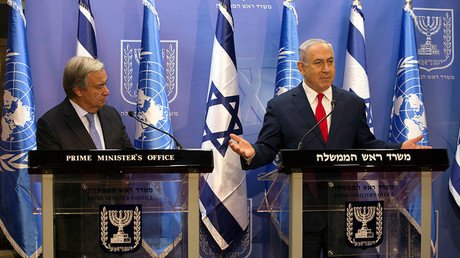‘Dramatic humanitarian crisis’: UN chief visits Gaza, urges Israel to end decade-long blockade
The UN Secretary-General has called on Israel to end its 10-year blockade of Gaza, calling it one of the worst humanitarian crises he’d ever seen.
Speaking from Gaza Wednesday, Antonio Guterres says he hasn’t seen a humanitarian crisis like the one in Gaza for years.
“Yesterday I was in Ramallah. Today I am in Gaza, unfortunately, to witness one of the most dramatic humanitarian crises that I’ve seen for many years working as a humanitarian in the United Nations.”
After spending several hours in Gaza, Guterres called on Israel to lift the blockade that’s been in place around the Palestinian enclave for a decade now.
The UN Secretary-General’s visit and comments comes amid a period of heightened tensions between Israel and the UN. Earlier this week, the Israeli deputy foreign minister, Tzipi Hotovely, warned that Tel Aviv's support for the international body was not unconditional.
“We are seeking a dramatic change in the way the UN treats Israel. It’s time to place the issue squarely on the table and address it head-on. If the UN does not drastically change its behavior it will lose both support and funding,” Hotovely said Sunday.
The UN has repeatedly condemned Israel’s behavior towards the Palestinians. Under Resolution 1860, adopted in January 2009, Israel was to withdraw all its forces around the Gaza strip and abide by an immediate ceasefire, allowing much needed food, fuel and medical supplies to enter the besieged strip of land. Israel, has however, refused to co-operate.
The blockade around Gaza means that people are unable to leave even if they have medical emergencies. One such person is 20-year-old Khalid Hamdan, who despite suffering from chronic heart disease, has been refused permission to leave Gaza for the past seven months.
“My sickness is tightness in the aortic valve. It’s a chronic disease and a congenital defect. The referral procedure is very important because I must leave to have open-heart surgery and replace the defective valve,” Hamdan told RT.
“From February until now we’ve applied monthly to get his permit. He was supposed to have his surgery,” added Khalid’s mother. “His muscle has to stay strong. If it weakens, he will be in serious condition. He will not be able to have any surgery after that.”
'So sad our school is destroyed': #Israel razes EU-funded schools for Palestinian children (VIDEO) https://t.co/Hn1a2O09gA
— RT (@RT_com) August 29, 2017
The UN Secretary-General is on his first official visit to the region, having arrived in Israel on Sunday. Guterres has visited the Yad Vashem Holocaust memorial and laid a wreath at the Hall of Remembrance.
The UN chief told Israel's President Reuven Rivlin Monday that although he disagreed with many of Israel’s positions and policies, he viewed calls for its destruction as “a form of modern anti-Semitism.”













